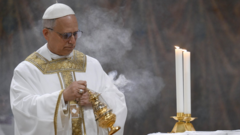In a significant ruling, the Illinois Supreme Court has exonerated actor Jussie Smollett of the disorderly conduct charges linked to his 2019 claim of staging a hate crime against himself in Chicago.
Illinois Supreme Court Acquits Jussie Smollett of Disorderly Conduct Charges

Illinois Supreme Court Acquits Jussie Smollett of Disorderly Conduct Charges
The court's ruling highlights deep divisions in perceptions of justice in a high-profile case involving staged hate crime allegations.
The Illinois Supreme Court has officially reversed the conviction against actor Jussie Smollett, who was accused of orchestrating a racist and homophobic attack against himself in 2019. Smollett, who identifies as both black and gay, faced five counts of disorderly conduct after claiming he was assaulted by two men shouting racial slurs, who then placed a noose around his neck. Evidence presented in court revealed that two brothers testified they were paid $3,500 by Smollett to fabricate the incident.
Initially convicted in 2021, Smollett received a sentence of 150 days in prison but spent only six days behind bars before being released to await an appeal. The Illinois Supreme Court's decision came after Smollett's legal team contested the legitimacy of the charges pressed by a special prosecutor, claiming these charges were unjust after Cook County prosecutors had previously dropped them in a deal involving community service.
The ruling has ignited backlash, including harsh criticism from former Chicago Mayor Rahm Emanuel, who condemned the perception that Smollett had evaded prosecution without facing consequences for his actions. "The city is angry," he commented, emphasizing the feeling of injustice among the public.
In their judgment, the Supreme Court noted the extensive public interest surrounding the case and acknowledged widespread dissatisfaction with the previous outcome, stating that disregarding agreements upon which individuals have relied would be more unjust than the original case itself. During the trial, prosecutors contended that Smollett's motivations stemmed from dissatisfaction with a television network's handling of hate mail sent to him. Despite his assertions that the assault was real and not staged, testimonies from the two brothers indicated otherwise.
As the case closes, it leaves behind a narrative filled with controversy and a divided public response concerning issues of accountability and justice in the realm of alleged hate crimes.
Initially convicted in 2021, Smollett received a sentence of 150 days in prison but spent only six days behind bars before being released to await an appeal. The Illinois Supreme Court's decision came after Smollett's legal team contested the legitimacy of the charges pressed by a special prosecutor, claiming these charges were unjust after Cook County prosecutors had previously dropped them in a deal involving community service.
The ruling has ignited backlash, including harsh criticism from former Chicago Mayor Rahm Emanuel, who condemned the perception that Smollett had evaded prosecution without facing consequences for his actions. "The city is angry," he commented, emphasizing the feeling of injustice among the public.
In their judgment, the Supreme Court noted the extensive public interest surrounding the case and acknowledged widespread dissatisfaction with the previous outcome, stating that disregarding agreements upon which individuals have relied would be more unjust than the original case itself. During the trial, prosecutors contended that Smollett's motivations stemmed from dissatisfaction with a television network's handling of hate mail sent to him. Despite his assertions that the assault was real and not staged, testimonies from the two brothers indicated otherwise.
As the case closes, it leaves behind a narrative filled with controversy and a divided public response concerning issues of accountability and justice in the realm of alleged hate crimes.




















